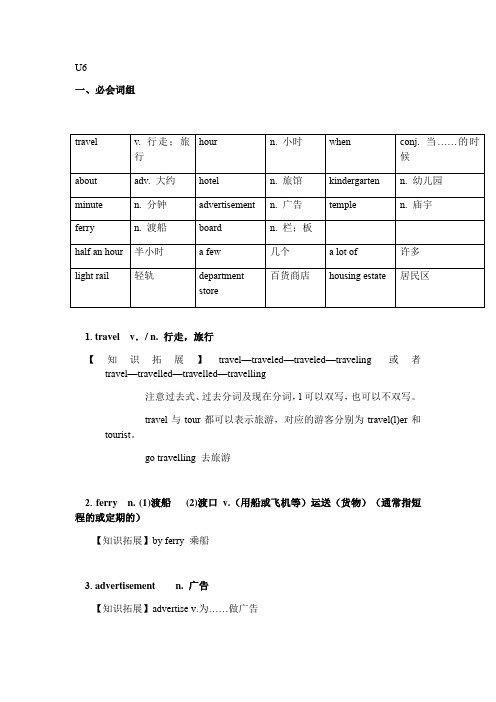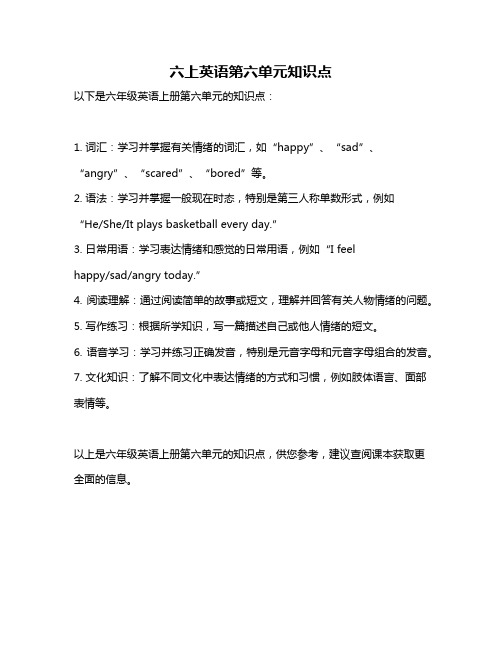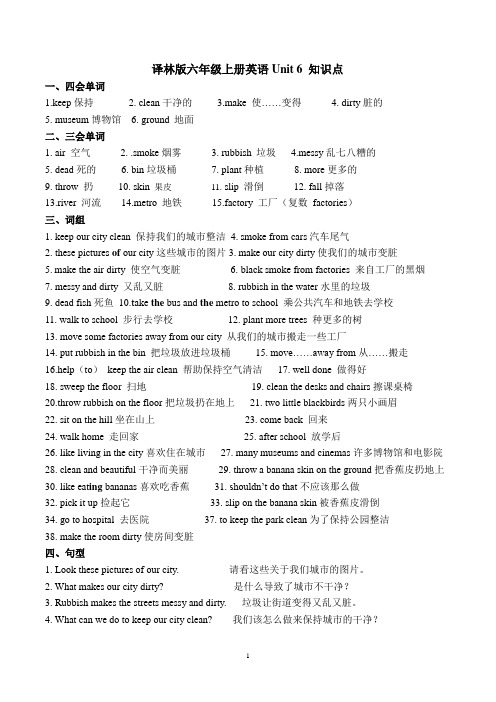六年级英语上册第六单元知识点总结
6年级上册英语书第6单元单词

6年级上册英语书第6单元单词第一部分:介绍1.1 本文将介绍六年级上册英语书第六单元的单词内容,包括单词的拼写、发音和用法,并帮助读者更好地掌握这些单词。
1.2 第六单元的单词内容主要围绕生活中的家庭、家务和日常活动展开,是孩子们日常生活中常见的内容,通过学习这些单词,能够帮助他们更好地表达和理解生活中的各种情景。
第二部分:单词列表及解释2.1 单词列表以下是第六单元的单词列表:1. family2. mother3. father4. sister5. brother6. grandmother7. grandfather8. aunt9. uncle10. cousin11. baby12. cook13. clean14. wash15. shop16. play2.2 单词解释- family:家庭- mother:母亲- father:父亲- sister:姐妹- brother:兄弟- grandmother:祖母- grandfather:祖父- aunt:阿姨- uncle:叔叔- cousin:表兄弟/表姐妹- baby:婴儿- cook:烹饪- clean:打扫- wash:洗涤- shop:购物- play:玩耍第三部分:单词用法及示例3.1 单词用法这些单词主要用于描述家庭成员、家务活动以及日常生活中的活动内容。
3.2 示例- My family has four people: my father, mother, brother, and me. - My grandmother likes to cook delicious food for us.- We need to clean the house every weekend.- I often play with my sister after school.第四部分:单词练习4.1 单词拼写请根据单词的英文意思完成单词的拼写:1. Mother (母亲)2. Brother (兄弟)3. Clean (打扫)4. Play (玩耍)5. Cousin (表兄弟/表姐妹)4.2 单词填空请根据句子的意思填写适当的单词:1. I help my mother ____________ (cook/clean) dinner every day.2. My ____________ (grandfather/grandmother) loves to tell me stories.3. Let's go to the park and ____________ (shop/play) some games. 第五部分:总结5.1 通过本文的介绍,相信读者们已经对六年级上册英语书第六单元的单词有了一定的了解,希望大家能够在课堂上和家庭中多加练习,更好地掌握这些单词的拼写、发音及用法,努力提高自己的英语水平。
北京版六年级英语上册第六单元知识点总结

UNIT6知识点总结He is wearing a pair of black shoes.他穿的是一双黑色皮鞋。
He is a lawyer.他是一名律师。
He looks so serious.他看起来很严肃。
LESSON20She is my cousin.她是我的表姐。
She is a singer.她是一名歌手。
How beautiful she looks!她看起来真漂亮!She wears pretty dresses on stage.她在舞台上会穿漂亮的连衣裙。
Purple is her favourite colour.她最喜欢的颜色是紫色。
She loves to wear purple dresses very much.她非常喜欢穿紫色的连衣裙。
LESSON21Lingling is wearing a nice sweater from her cousin.玲玲穿的是她表姐给的一件漂亮的毛衣。
Her cousin is1.68meters.Lingling is1.58meters.她表姐1.68米。
玲玲1.58米。
Her cousin wears a Large.Lingling wears a Medium.她表姐穿L号的。
玲玲穿M号的。
Her mum made her a pretty bag by hand.她妈妈给她手工做了一个漂亮的包。
Her mum can make clothes by hand,too.她妈妈也会手工做衣服。
She enjoys making clothes.她喜欢做衣服。
【功能句型】What is he wearing?他穿的是什么?He is wearing a blue suit.他穿的是一套蓝色西服。
He is wearing a red hoody.他穿的是一件红色帽衫。
He is wearing a pair of jeans.他穿的是一条牛仔裤。
六年级上册英语u6知识点

六年级上册英语u6知识点以下是六年级上册英语U6的知识点总结:一、词汇本单元涉及的词汇主要包括学校设施、课程和活动相关的单词,例如:•gym 体育馆•art room 美术室•music room 音乐室•computer room 电脑室•library 图书馆•playground 操场•science lab 科学实验室•PE class 体育课•music class 音乐课•art class 美术课•computer class 电脑课二、句型1.询问某人在哪里:Where is ...? / Where are ...? 例如:Where is the gym? 体育馆在哪里?2.询问某人是否喜欢某物或做某事:Do you like ...? 例如:Do you like PE class? 你喜欢体育课吗?3.询问某人是否在某个地方:Is ... in/on/under ...? 例如:Is the ball in the gym? 球在体育馆里吗?4.表达喜欢做某事:I like ... 例如:I like playingbasketball. 我喜欢打篮球。
5.表达某人在某处做某事:... is/are ...ingin/on/under ... 例如:They are playing football on the playground. 他们在操场上踢足球。
三、语法1.现在进行时的用法:表示正在进行的动作或状态,通常由“be动词(am/is/are)+动词-ing”构成。
例如:They areplaying football. 他们正在踢足球。
2.一般现在时的用法:表示经常或习惯性的动作或状态,以及客观事实或普遍真理。
例如:I like playing basketball. 我喜欢打篮球。
3.特殊疑问句的用法:以特殊疑问词(如where、what、who等)开头的疑问句,用于询问特定的信息。
牛津英语六年级上册第6单元知识点归纳

Unit 6 Going to school1. traveling time to school 去学校行走时间2. it takes sb. some time to do sth. 某人花一段时间做某事3. It takes him about ten minutes. 他花大约十分钟。
4. half an hour 半小时5. go to sp. by ferry 乘渡船去某地6. go to school on foot=walk to school 步行去学校7. how long 多久8. get to sp. 到达某地9. get to the supermarket 到达超市10. get there/here/home 到达那儿/这儿/家里11. a restaurant 一个饭店12. a hotel 一个旅馆13. an advertisement board 一块广告牌14. a few + c.n. 几个;一些(后跟可数名词复数)15. a lot of + c.n. & u.n. 许多(后跟可数名词复数或不可数名词)16. on one’s way to school 在某人去某地的路上17. on my way to school 在我去学校的路上18. by light rail 乘轻轨19. department stores 百货商店20. go to kindergarten 上幼儿园语言点1. near 离…很近后面直接接地点I live near school.=My home is near school.我家离学校很近。
2. far away from=far from离…很远He lives far away from school.=His home is far from school.他家离学校很远3. by bus/bike/car/underground/train/ferry其他的交通工具都能用take来表示乘,但bike只能用ride take a bus/bike/car/underground/train/ferry ride a bikeHe goes to school by bus.=He takes a bus to school.He goes to school by bike.=He rides his/a bike to school.=He cycles to school. 4. on footShe goes to work on foot every day.=She walks to work every day.5. It takes sb. some time to do sth. 花费某人多少时间做某事。
六年级上册英语第六单元知识点

六年级上册英语第六单元知识点一.主要单词和短语a ngry生气 afraid害怕 sad伤心 worried担心 happy快乐wear穿 more更多 deep深 breath呼吸 popcorn爆米花make制作 wait等 check检查 planted种植(plant过去式) grow生长see a doctor看医生 take a deep breath深呼吸 count to ten 数到十a little worried有一点点担心be angry with…与。
生气be afraid of ... 害怕...... do more exercise做更多的运动wear warm clothes穿暖和的衣服 get some drinks拿一些饮料have some popcorn 吃一些爆米花 chase the mice追赶老鼠二.主要句子和知识点1. They are afraid of him. 他们害怕它。
be afraid of 意为“ 害怕某人”。
如: I am afraid of my English teacher. 我害怕我的英语老师。
2. The cat is angry with them. 这只猫很生它们的气。
be angry with意为“ 对某人生气”。
如: My mother is angry with me. 妈妈很生我的气。
3. What’s wrong?怎么啦?出什么事了?此句用于询问对方有什么问题或有什么不顺心的事情。
如:—What’s wrong, Jim? 吉姆,你怎么啦?— I am ill. 我生病了。
4.Your father is ill. 你爸爸生病了。
5.He should see a doctor this morning. 他今天早上应该去看病。
should 为情态动词,表示“应该,应当”。
此句用来给别人提建议。
如:He should work harder. 他应该更加努力。
牛津上海版英语六年级上册Unit6知识点及语法点

U6一、必会词组1. travel v./ n. 行走,旅行【知识拓展】travel—traveled—traveled—traveling或者travel—travelled—travelled—travelling注意过去式、过去分词及现在分词,l可以双写,也可以不双写。
travel与tour都可以表示旅游,对应的游客分别为travel(l)er和tourist。
go travelling 去旅游2. ferry n. (1)渡船(2)渡口v.(用船或飞机等)运送(货物)(通常指短程的或定期的)【知识拓展】by ferry 乘船3. advertisement n. 广告【知识拓展】advertise v.为……做广告4. board n. 栏;板【知识拓展】abroad adv. 在国外,到国外。
broad adj. 宽广的。
形象记忆board这个单词:首尾bd两个字母想象成船头和船尾,中间oar是一个单词,意思是“桨”,所以board有“甲板,上船”的意思。
5. a few 几个。
a few只能修饰可数名词复数形式,与之对应的是a little, 只能修饰不可数名词。
练习:I.Read and complete the sentences.(根据给出的首字母,完成句子。
)1. I have been to Jing’an T .It's in the centre of Shanghai.2. My father’s office is far away from home. He goes to work by l r every morning because it is fast.3. Mum likes going to some department s at weekends.4. We live in a new h e . It's large and beautiful.keys: 1.Temple 2.1ight rail 3.stores 4.housing estate 【乘坐交通方式表达】乘坐交通工具的表达:by bus/by car/by underground/by bike/by plane/by ferry /on foot乘公共汽车/乘小汽车/乘地铁/骑自行车/乘飞机/乘轮渡/步行。
六上英语第六单元知识点

六上英语第六单元知识点
以下是六年级英语上册第六单元的知识点:
1. 词汇:学习并掌握有关情绪的词汇,如“happy”、“sad”、“angry”、“scared”、“bored”等。
2. 语法:学习并掌握一般现在时态,特别是第三人称单数形式,例如
“He/She/It plays basketball every day.”
3. 日常用语:学习表达情绪和感觉的日常用语,例如“I feel
happy/sad/angry today.”
4. 阅读理解:通过阅读简单的故事或短文,理解并回答有关人物情绪的问题。
5. 写作练习:根据所学知识,写一篇描述自己或他人情绪的短文。
6. 语音学习:学习并练习正确发音,特别是元音字母和元音字母组合的发音。
7. 文化知识:了解不同文化中表达情绪的方式和习惯,例如肢体语言、面部表情等。
以上是六年级英语上册第六单元的知识点,供您参考,建议查阅课本获取更全面的信息。
译林版六年级上册英语Unit 6 知识点归纳

译林版六年级上册英语Unit 6 知识点一、四会单词1.keep保持2. clean干净的3.make 使……变得4. dirty脏的5. museum博物馆6. ground地面二、三会单词1. air 空气2. .smoke烟雾3. rubbish垃圾4.messy乱七八糟的5. dead死的6. bin垃圾桶7. plant种植8. more更多的9. throw 扔10. skin果皮11. slip 滑倒12. fall掉落13.river 河流14.metro 地铁15.factory 工厂(复数factories)三、词组1. keep our city clean 保持我们的城市整洁4.smoke from cars汽车尾气2. these pictures of our city这些城市的图片3.make our city dirty使我们的城市变脏5.make the air dirty 使空气变脏6.black smoke from factories 来自工厂的黑烟7. messy and dirty 又乱又脏8. rubbish in the water水里的垃圾9. dead fish死鱼10.t ake the bus and the metro to school 乘公共汽车和地铁去学校11. walk to school 步行去学校12. plant more trees 种更多的树13. move some factories away from our city 从我们的城市搬走一些工厂14. put rubbish in the bin 把垃圾放进垃圾桶15. move……away from从……搬走16.help(to)keep the air clean 帮助保持空气清洁17. well done 做得好18. sweep the floor 扫地19. clean the desks and chairs擦课桌椅20.throw rubbish on the floor把垃圾扔在地上21. two little blackbirds两只小画眉22. sit on the hill坐在山上23. come back 回来24. walk home 走回家25. after school 放学后26. like living in the city喜欢住在城市27. many museums and cinemas许多博物馆和电影院28. clean and beautiful干净而美丽29. throw a banana skin on the ground把香蕉皮扔地上30. like eat ing bananas喜欢吃香蕉31. shouldn’t do that不应该那么做32. pick it up捡起它33. slip on the banana skin被香蕉皮滑倒34. go to hospital 去医院37. to keep the park clean为了保持公园整洁38. make the room dirty使房间变脏四、句型1. Look these pictures of our city. 请看这些关于我们城市的图片。
- 1、下载文档前请自行甄别文档内容的完整性,平台不提供额外的编辑、内容补充、找答案等附加服务。
- 2、"仅部分预览"的文档,不可在线预览部分如存在完整性等问题,可反馈申请退款(可完整预览的文档不适用该条件!)。
- 3、如文档侵犯您的权益,请联系客服反馈,我们会尽快为您处理(人工客服工作时间:9:00-18:30)。
六年级英语上册第六单元知识点总结导读:我根据大家的需要整理了一份关于《六年级英语上册第六单元知识点总结》的内容,具体内容:六年级英语是小学同学们学习的一个非常重要的事情,下面是我给大家带来的,希望能够帮助到大家!Unit 6 How do you feel?Part A一、...六年级英语是小学同学们学习的一个非常重要的事情,下面是我给大家带来的,希望能够帮助到大家!Unit 6 How do you feel?Part A一、主要词汇①形容词:angry生气的 afraid害怕的 ill生病的 worried担心的happy高兴的二、课文导入AHey, lets have some popcorn.Yum! I m so happy. I love popcorn!Here you are.【1】 I ll go and get some drinks. wait for me.【2】 Hey, where is my popcorn?Yum! It was so good.What? How could you eat all the popcorn?!【3】We should share! Mum, if I feel angry, what should I do?【4】Well,first,take a deep breath. 【5】Then you should count to ten.After that...?After that, you wont feel so angry.Mum, I feel ill. Should I count to ten,too?No,dear,you should see a doctor.1、Here you are!给你!这是一个部分倒装的句子。
当句子以here,there,away等地点副词开头,且谓语动词是be动词,come,go等时,句子常用倒装结构。
①在倒装句中,如果主语是人称代词,则主语与谓语不倒装,构成"Here/there/away...+ 主语 + 谓语动词"部分倒装结构。
例句:Here we are!我们到了!Away he went!他离开了!②如果句子的主语为名词,句子常用完全倒装结构,即构成"here/there/away...+谓语动词+主语"结构。
例句:Here comes the bus!公共汽车来了There goes Mike!麦克走去那边了2、wait 等待; wait for sb/sth 等待某人/某物3、How could you eat all the popcorn?!你怎么能吃光所有的爆米花?!特殊疑问代词how:如何(方式),怎样(感受),怎么可以(质问)Could是can的过去式这是一个由how引导的含有情态动词could的特殊疑问句,其基本句型为:how could + sb + 动词原形 + 其他?;该句型意为"某人怎么能做某事呢?" ,用于表示震惊、强烈反感或愤怒。
其中could也可以换为can。
How can you say that?你怎么可以说那样的话?!How can you eat up my apples?你怎么可以吃光我的苹果?!4、If I feel angry, what should I do?If,意为"如果......"Feel angry, "感觉是生气的/感觉很生气"Feel 是连系动词,连系动词兼有be动词和行为动词的双重性质。
一方面连系动词后面和be动词一样,后要跟形容词作表语;另一方面,如果要将含有连系动词的句子改为疑问句或否定句,改法与含有行为动词的2类句子一样!I feel ill 我感觉是生病的/ 我感觉生病了!I dont feel ill 我没感觉生病!Do you feel ill?你感觉生病了吗?What should I do?我应该做什么?5、Well,first,take a deep breath.Well,常用在英语句子开头,无具体意思,相当于一个语气词!First,意为"第一" ,是one的序数词,"第一"经常引申为"首先"的意思,表示句子里的谓语动作是最先/第一个做的!Let s clean the bedroom first!让我们首先来打扫房间!BSam:Whats this cartoon about?【1】Saran:It s about a cat. The cat is a police officer.Sam:He chases the mice. Theyre afraid of 【2】him.Saran:Why?Sam:Because the mice are bad. They hurt people. The cat is angry with【3】 them.Saran:Maybe our cat is chasing a mouse now!【4】1、Whats this cartoon about?About,介词,意为"关于......的".I want to see a film about space travel我想看一部太空旅行的电影Be about sth,"是关于......的"划线部分提问:It is about a cat.What is it about?2、be afraid of... 对...是很害怕的;害怕......Children are always afraid of ghost.The mice are afraid of cats3、be angry with... 对...是很生气的;生....的气Because Mike doesnt finish homework,the teacher is angry with him.She is angry with me4、Maybe our cat is chasing a mouse now!Maybe,意为"也许......", 一般放在句首;Be+动词ing,表示"正在做......";Sarah is watching TV in the living roomMike is reading bookstore in the study巩固练习一、单词1、生气的_________2、害怕的_________3、担心的____________4、穿____________5、深的___________6、呼吸____________7、受伤__________ 8、觉得感到_________ 9、担心____________10、陷住_____ 1 1、拉拽_______ 12、有病的____________13、mouse(复数)____________ 14、hurt(过去式)____________二、词组1、看病____________2、深深吸一口气____________3、数到十____________4、害怕___________5、过来____________6、下一次____________7、wear warm clothes____________8、do more exercise____________9、感到生气____________三、选择题( )1.Whats the cat doing ? He is __________the__________.A. chase mousesB. chasing miceC.chases mousse( )2.Look! How__________he students are on the playground!A.illB. tiredC. happy( )3.Whats__________with you?A. sadB. illC. wrong( )4. Dont__________.I will help you.A. wrongB. happyC. Worry( )5.Sarah feels ill. She should ________this morning.A. eat some fruitB.go to schoolC.see the doctor( )6.How ________ Sara feel?A. doB.doesC. did( )7. __________are you going?A. WhereB. WhatC. where( )8. We__________ alw ays be nice to each other.A. shouldB. wouldC. will( )9. My uncle is a fisherman.He works__________sea.A.inB. atC. on( )10. My mother is angry__________me.A. fo rB. ofC. with四、按要求完成下列各题1.The cat______ ______ ______him. 这只猫很生他的气。
2. Im afraid of seeing a doctor. What should I do ?You should ____ ___ ___ ____(深呼吸)and _____ to _____.(数到十) 3. His mother works in a hospital.(改为否定句)_________________________________________4. He feels happy. (就划线部分提问)_________________________________________5.Amy feels angry.(改为一般疑问句,并做肯定回答)_________________________________________6、______ could you ______all the popcorn?!We should ______ !你怎么把所有的爆米花都吃了,我们应该分享的。
五、把相应的答句的序号填写在问句的括号内1. ( )Where is the cinema? A. He is happy.2. ( )What should I do? B. He is a businessman.3. ( )How does he feel now? C. Yes, he does.4. ( )What does your father do? D.You should see a doctor.5. ( )Does he live in Beijing? E.Its next to the bookstore.六、连词成句1.talking ,are ,they, about ,books ,science___________________________________________2 go, the, to ,can, zoo ,time, next ,we___________________________________________3.shall, to ,go, the ,today, cinema, we__________________________________________4. worried, the, are, Amy, and, dog___________________________________________5.going, Robin, grass, is, sit, to , the, on._ __________________________________________七、阅读理解Im happy today. Beacause I have no lessens on Saturdays. I get up very late. When I wash my face,it is about ten oclock. So I have no time for my breakfast. My mother is not happy.She think its not heathy for me.I have chicken and rice for lunch.After that,I go to the park with my parents. It takes us about ten minutes to get there by bi ke. There are many people in the park. There is a big lake in the middle of the park. Some children are swimming, some are boating with their parents. I like boating very much. I want to boat, too. We have a good time there. How happy we are!( )1. I m boating in the park with my ______.A.good friendsB.father and motherC.classmatesD.teachers( )2. I often ______ on Saturdays.A. go to schoolB. get up earlyC. get up lateD. go to bed late ( )3. On Saturdays, there are _______ people in the park.A. muchB.very muchC.a littleD.lots of( )4. I like ______ very much.A.playing basketballB.boatsC.swimmingD.boating( )5. I have no lessons ______.A.every dayB.todayC. on SundayD. todayPart B一、主要词组See a doctor看医生 do more exercise 做更多的运动Wear warm clothes穿暖和的衣服 take a deep breath深呼吸Count to ten数到十二、课文导入Mum:Sarah,Sam,come here【1】,please.Sarah:Whats wrong?【2】Mum:Your father is ill.He should see a doctor this morning, so we cant go to the zoo today.Sam:Oh, no!Mum:Dont be sad. 【3】We can go next time.【4】Sam:How does Dad feel now?【5】Mum:Not well.Lets go to the hospital!1、come here,"来这里" ,反义词:go there "去那边"2、What s wrong?直译:" 什么是错的,有问题的?"引申:" 怎么了?/ 有什么问题?"它常用来询问对方所遇到的不开心或麻烦的事,也是医生或者护士询问病人病情时常用的句型。
